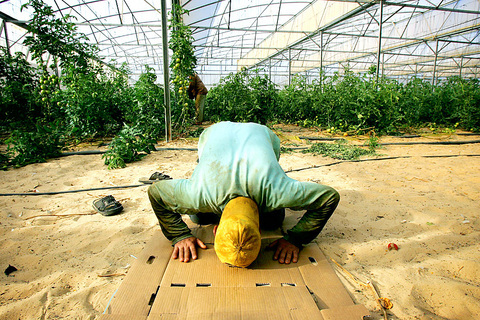Israeli Prime Minister Ariel Sharon -- in spectacular fashion and with both overt and tacit support from Washington -- is fast imposing a blueprint for Israel's permanent borders that would extend beyond the 1967 frontiers the Palestinians say should frame their future state.
Two parliamentary votes this week cleared the final hurdles to Sharon's plan to vacate the Gaza Strip and four West Bank settlements this summer. The government also plans to expand the West Bank's largest Jewish settlement, vowing to encompass it and others on the Israeli side of a massive separation barrier.
Many Israelis hope that Sharon's "disengagement" plan will be the beginning of the end of Israel's occupation of land captured in the 1967 Middle East war and possibly pave the way for a two-state solution to the Arab-Israeli conflict.

PHOTO: AFP
But Sharon's go-it-alone approach -- imposing realities on the ground even before negotiations begin -- is likely to hurt peace prospects, torpedo hopes for a contiguous Palestinian state and undermine efforts by the new Palestinian leadership to show their people that moderation pays.
Palestinians say Washington's unwavering support for Israeli policies -- all in the name of shoring up Sharon as he tries to push through "disengagement" -- damages efforts to build confidence just as peace hopes are at their highest level in years following the death of former Palestinian president Yasser Arafat.
"If there is any change to the 1967 borders, it must be within the framework of negotiations and it must be through an equal exchange of land ... and not by enforcing realities on the ground," Palestinian Foreign Minister Nasser al-Qidwa said in the West Bank city of Ramallah on Wednesday.
Sharon will meet with US President George W. Bush in Texas next month, and several Israeli officials said they expect Sharon to seek further US support for Israel's plan to hold on to large tracts of West Bank land near Jerusalem in any future peace deal.
Citing fierce domestic opposition to disengagement, Israel has quietly asked the US to refrain from criticizing it about settlement expansion or any other issue until after the pullouts are complete this summer, Israeli officials confirmed.
That request -- and the apparent US acquiescence to it -- highlights the enormous importance both nations are placing on the withdrawal plan.
US Secretary of State Condoleezza Rice has sent conflicting signals about Israel's plans to build 3,650 homes around the Maaleh Adumim settlement near Jerusalem, which if completed would cut off West Bank Palestinians from their intended capital in East Jerusalem.
In an interview with the Los Angeles Times, Rice said the expansion was "at odds" with US policy, her sharpest criticism of Israel since taking office in January. Then she appeared to step back, declining in a subsequent interview with the Washington Post to repeat the assertion.
Later, she reaffirmed Washington's support for Israel to retain major West Bank settlements under an eventual peace deal, telling Israel Radio that "the changes on the ground, the existing major Israeli population centers will have to be taken into account in any final status negotiation."

Kehinde Sanni spends his days smoothing out dents and repainting scratched bumpers in a modest autobody shop in Lagos. He has never left Nigeria, yet he speaks glowingly of Burkina Faso military leader Ibrahim Traore. “Nigeria needs someone like Ibrahim Traore of Burkina Faso. He is doing well for his country,” Sanni said. His admiration is shaped by a steady stream of viral videos, memes and social media posts — many misleading or outright false — portraying Traore as a fearless reformer who defied Western powers and reclaimed his country’s dignity. The Burkinabe strongman swept into power following a coup in September 2022

‘FRAGMENTING’: British politics have for a long time been dominated by the Labor Party and the Tories, but polls suggest that Reform now poses a significant challenge Hard-right upstarts Reform UK snatched a parliamentary seat from British Prime Minister Keir Starmer’s Labor Party yesterday in local elections that dealt a blow to the UK’s two establishment parties. Reform, led by anti-immigrant firebrand Nigel Farage, won the by-election in Runcorn and Helsby in northwest England by just six votes, as it picked up gains in other localities, including one mayoralty. The group’s strong showing continues momentum it built up at last year’s general election and appears to confirm a trend that the UK is entering an era of multi-party politics. “For the movement, for the party it’s a very, very big

ENTERTAINMENT: Rio officials have a history of organizing massive concerts on Copacabana Beach, with Madonna’s show drawing about 1.6 million fans last year Lady Gaga on Saturday night gave a free concert in front of 2 million fans who poured onto Copacabana Beach in Rio de Janeiro for the biggest show of her career. “Tonight, we’re making history... Thank you for making history with me,” Lady Gaga told a screaming crowd. The Mother Monster, as she is known, started the show at about 10:10pm local time with her 2011 song Bloody Mary. Cries of joy rose from the tightly packed fans who sang and danced shoulder-to-shoulder on the vast stretch of sand. Concert organizers said 2.1 million people attended the show. Lady Gaga

SUPPORT: The Australian prime minister promised to back Kyiv against Russia’s invasion, saying: ‘That’s my government’s position. It was yesterday. It still is’ Left-leaning Australian Prime Minister Anthony Albanese yesterday basked in his landslide election win, promising a “disciplined, orderly” government to confront cost-of-living pain and tariff turmoil. People clapped as the 62-year-old and his fiancee, Jodie Haydon, who visited his old inner Sydney haunt, Cafe Italia, surrounded by a crowd of jostling photographers and journalists. Albanese’s Labor Party is on course to win at least 83 seats in the 150-member parliament, partial results showed. Opposition leader Peter Dutton’s conservative Liberal-National coalition had just 38 seats, and other parties 12. Another 17 seats were still in doubt. “We will be a disciplined, orderly